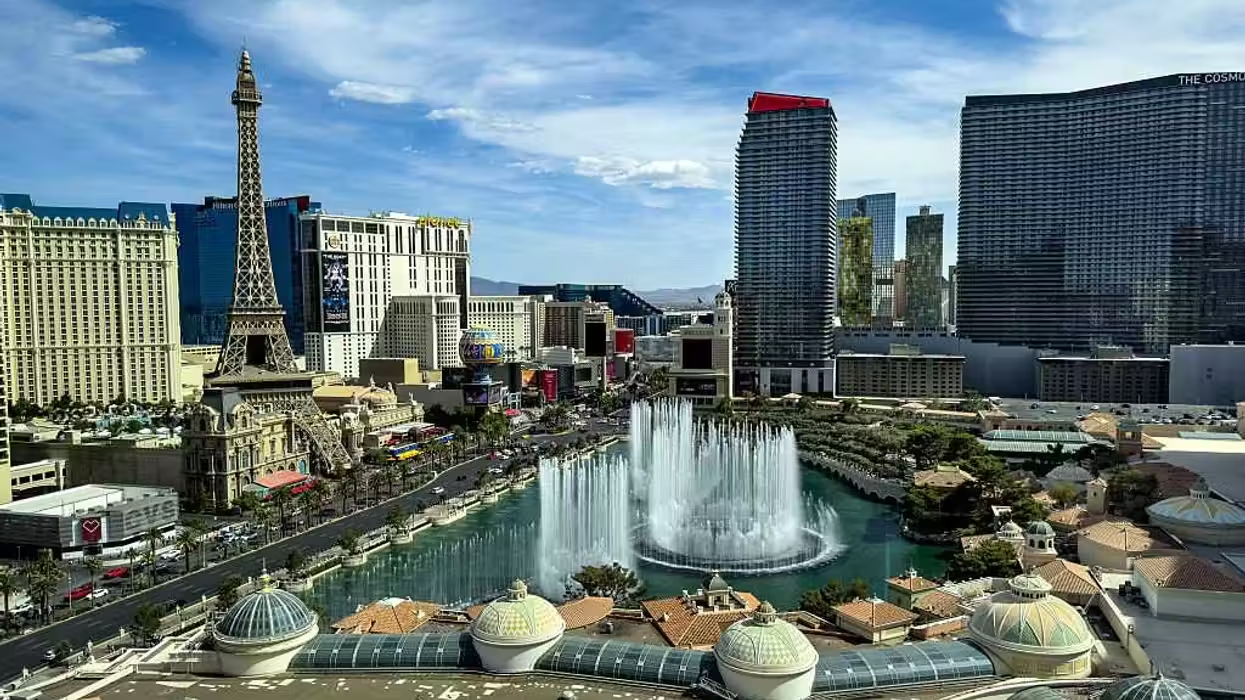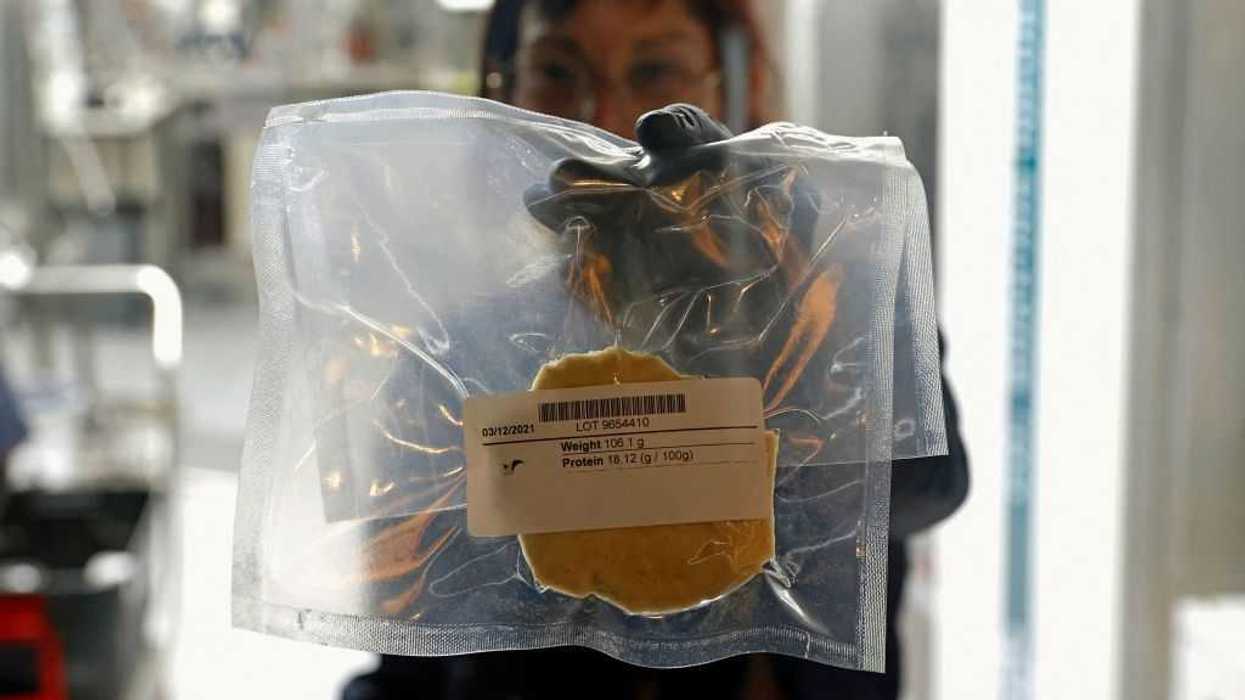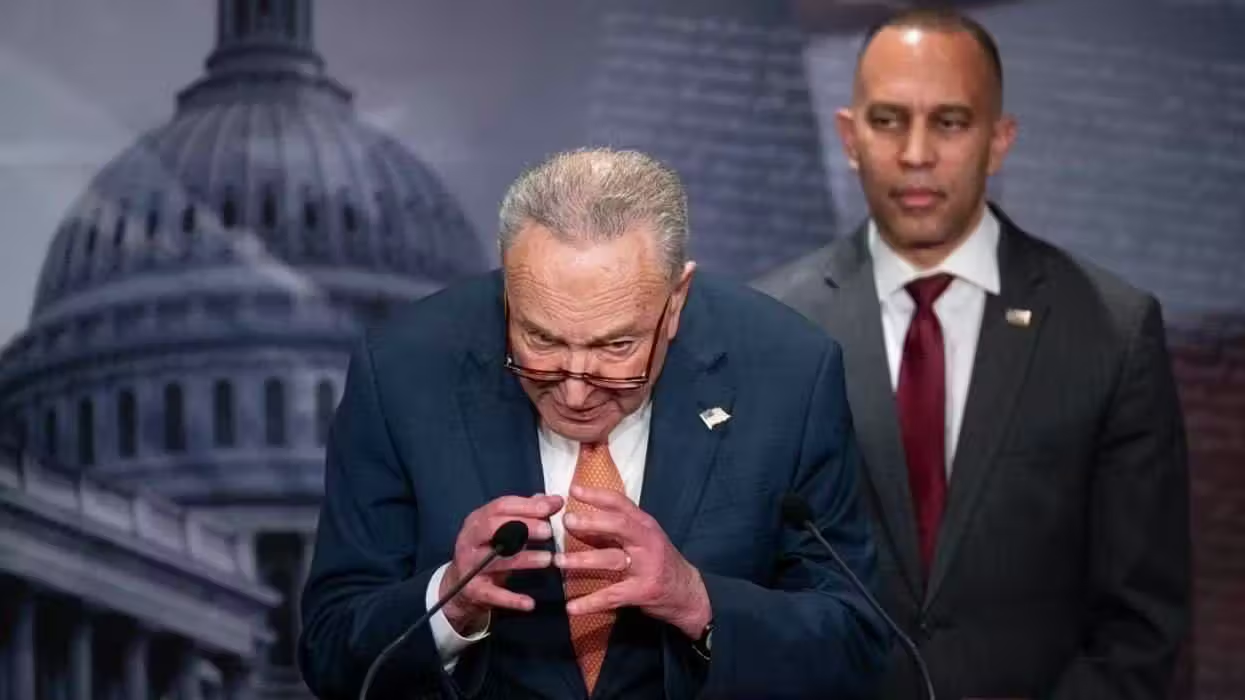
© 2026 Blaze Media LLC. All rights reserved.
"Europe is able to take care of their own problems."
ROCHESTER, Mich. (The Blaze/AP) -- United in agreement for once, Republican presidential rivals warned forcefully Wednesday night the United States could be doomed to the same sort of financial crisis that is afflicting Europe unless federal deficits are drastically cut and the economy somehow revived.
Though sexual harassment allegations facing Herman Cain have dominated the GOP campaign for more than a week, the debate in economically ailing Michigan focused almost entirely on financial worries and proposed solutions in the U.S.
The candidates generally stuck to practiced speech lines - with a late exception. In the middle of one answer, Texas Gov. Rick Perry found himself unable to recall the names of all three of the Cabinet-level agencies he wants to eliminate, even leaning over to Rep. Ron Paul for help at one point.
"The third agency of government I would do away with - the Education, the Commerce. And let's see. I can't. The third one I can't. Oops," he said, forgetting for a moment that he wants to abolish the Department of Energy.
On one specific issue that Congress must address soon, the candidates generally backed an extension of the Social Security payroll tax cut scheduled to expire at the end of the year. That was a rare moment of accord with President Barack Obama and many congressional Democrats, who have been warning that consumers could be hurt if the reduction is not renewed.
"I'm not prepared to raise taxes on working Americans in the middle of a recession that's this bad," said former House Speaker Newt Gingrich, a sentiment quickly seconded by former Massachusetts Gov. Mitt Romney.
Perry disagreed, and Rep. Michelle Bachmann of Minnesota said she opposed the one-year reduction when it was approved late last year. She said it had so far "blown a hole of $100 billion in the Social Security trust fund."
Asked about Europe's financial troubles, the candidates seemed to speak with one voice in saying Italy and other European countries should rise or fall on their own without any American bailout. And several of the White House hopefuls warned that unless U.S. deficits are cut and the economy invigorated, America is headed for the same type of downward spiral.
"Europe is able to take care of their own problems. We don't want to step in and bail out their banks and their economies," former Massachusetts Gov. Mitt Romney said as he and GOP rivals met for the first time in three weeks in campaign debate.
Even so, he said the United States should continue contributing to organizations like the International Monetary Fund that are working to prevent a meltdown in troubled economies overseas.
Paul was more emphatic about the debt. "You have to let it liquidate. We took 40 years to build up this worldwide debt," he added.
Cain said there wasn't much the United States could do to directly to help Italy at present because the economy there is in such difficult shape. "We need to focus on the economy or we will fail," he said, referring to the U.S. and calling for spending cuts, a strong dollar and measures to stimulate growth.
The Cain accusations did come up, though briefly.
"The American people deserve better than someone being tried in the court of public opinion due to unfounded accusations," he said when the question came up early in the debate. "I value my character and my integrity more than anything else. And for every one person that comes forward with an unfair accusation there are probably, there are thousands who come forward and say none of that ever happened with Herman Cain."
Romney, a former venture capitalist, was asked if he would keep Cain on the job as a CEO given the accusations. He responded, "Herman Cain is the person to respond to these questions. He just did."
On another point, Cain felt it necessary to make a post-debate apology to House Democratic leader Nancy Pelosi, whom he had called "Princess Nancy" for sidetracking Republican legislation when she was speaker.
The announced topic for the evening was the economy, a subject that produced few if any early sparks among rivals who often spar energetically.
Perry, Gingrich, Bachmann and former Pennsylvania Sen. Rick Santorum joined Romney, Cain, Paul and Huntsman on stage at Oakland University in Michigan, a state where unemployment is 11.1 percent and well above the national 9 percent jobless rate.
The debate took place less than two months before Iowa's kickoff caucuses, as the pace of campaign activity accelerates and public opinion polls suggest the race remains quite fluid. Romney and Cain currently share co-front-runner status in most surveys, with Perry and Gingrich roughly tied for third, within striking distance.
Not surprisingly, none of the contenders found much to like in Obama's economic stewardship.
Perry said the next president should systematically judge all of the government regulations enacted since Obama took office on a standard of whether they created jobs. Any that failed should be repealed, he said.
Bachmann sharply criticized Fannie Mae and Freddie Mac. She said the latter had recently given multimillion-dollar bonuses to executives even though it was seeking a new federal bailout.
Gingrich, who last held public office more than a decade ago, bristled when asked what advice his company had given Freddie Mac for a $300,000 fee. "Advice on precisely what they didn't do," he shot back - stop backing mortgages to applicants who aren't credit-worthy.
The government rescued mortgage giants Fannie Mae and Freddie Mac in September 2008 to cover their losses on soured mortgage loans. Since then, a federal regulator has controlled their financial decisions.
The cost to taxpayers so far has been about $169 billion, the most expensive bailout of the financial crisis.
There was only scant mention of the Michigan auto industry, which benefited in 2008 and 2009 from a federal bailout that both President George W. Bush and Obama backed.
All eight Republicans on the debate stage say they wouldn't have offered government assistance.
Not so Obama, who stood outside a factory not far from the debate site recently and said government bailouts of General Motors and Chrysler were a success that saved thousands of American jobs.
Want to leave a tip?
We answer to you. Help keep our content free of advertisers and big tech censorship by leaving a tip today.
Want to join the conversation?
Already a subscriber?
more stories
Sign up for the Blaze newsletter
By signing up, you agree to our Privacy Policy and Terms of Use, and agree to receive content that may sometimes include advertisements. You may opt out at any time.
Related Content
© 2026 Blaze Media LLC. All rights reserved.
Get the stories that matter most delivered directly to your inbox.
By signing up, you agree to our Privacy Policy and Terms of Use, and agree to receive content that may sometimes include advertisements. You may opt out at any time.







